An In-Depth Analysis of the Book of Hosea: Themes and Authorship
VerifiedAdded on 2020/04/01
|6
|1350
|252
Essay
AI Summary
This essay provides an in-depth analysis of the Book of Hosea, a prophetic book within the Hebrew Bible. It begins by exploring the conventions of biblical scholarship and the debates surrounding the authorship of Hosea, with some scholars attributing it to the prophet himself and others suggesting the involvement of his followers. The essay then delves into the historical context of Hosea's ministry, which occurred during the reign of King Jeroboam II in the Northern Kingdom of Israel, a period marked by societal deviation from God's ways and increasing threats from the Assyrian empire. The central themes of the book are examined, including God's enduring love, hope for restoration, and mercy towards humanity, illustrated through Hosea's marital life and prophecies. The unchanging character and nature of God are also emphasized, highlighting the importance of faithfulness and commitment in a relationship with God. The essay concludes by reflecting on the relevance of Hosea's teachings, particularly for the author's personal faith as a Sikh, emphasizing the importance of worshipping one God and remaining loyal to His commands.
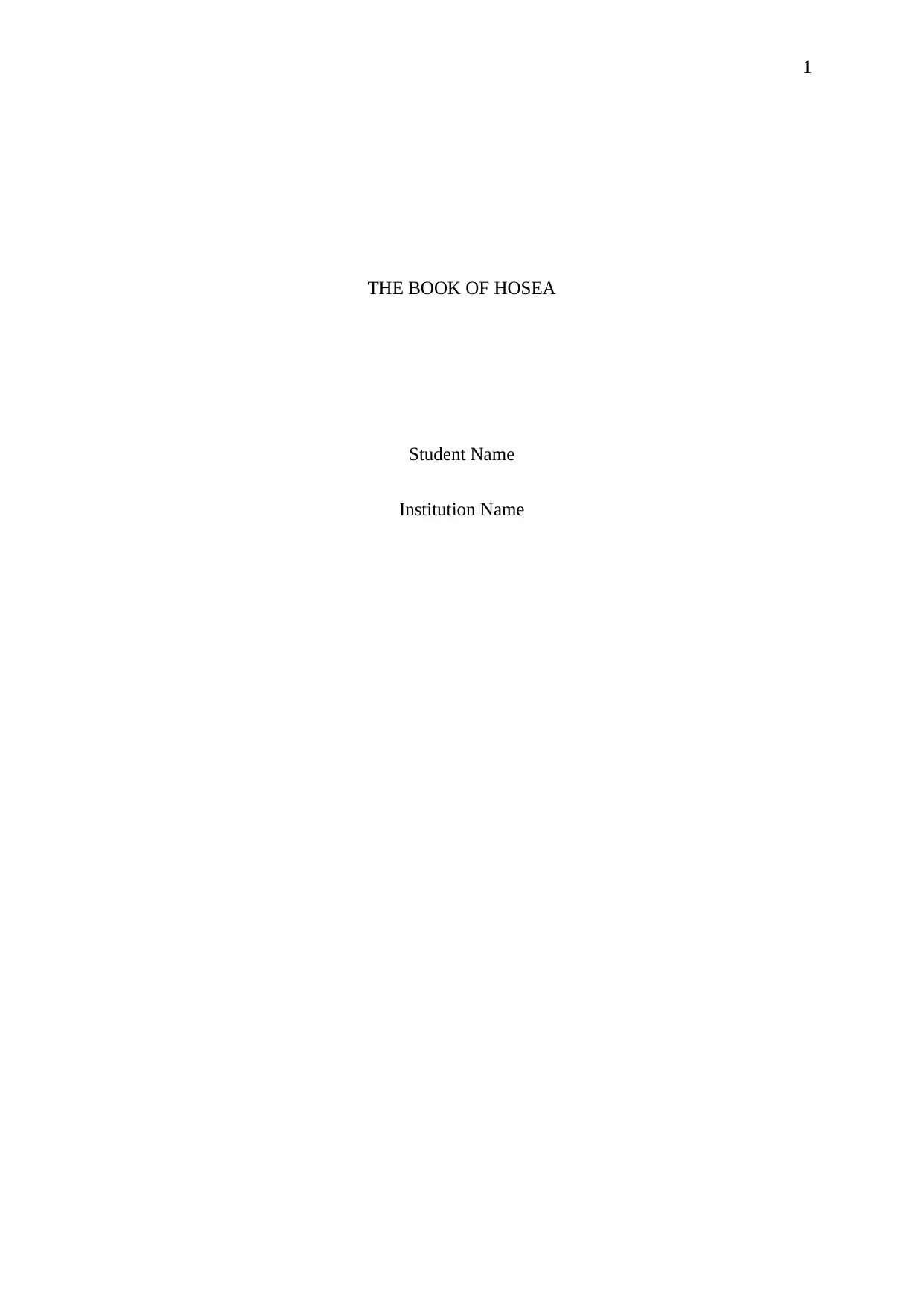
1
THE BOOK OF HOSEA
Student Name
Institution Name
THE BOOK OF HOSEA
Student Name
Institution Name
Paraphrase This Document
Need a fresh take? Get an instant paraphrase of this document with our AI Paraphraser
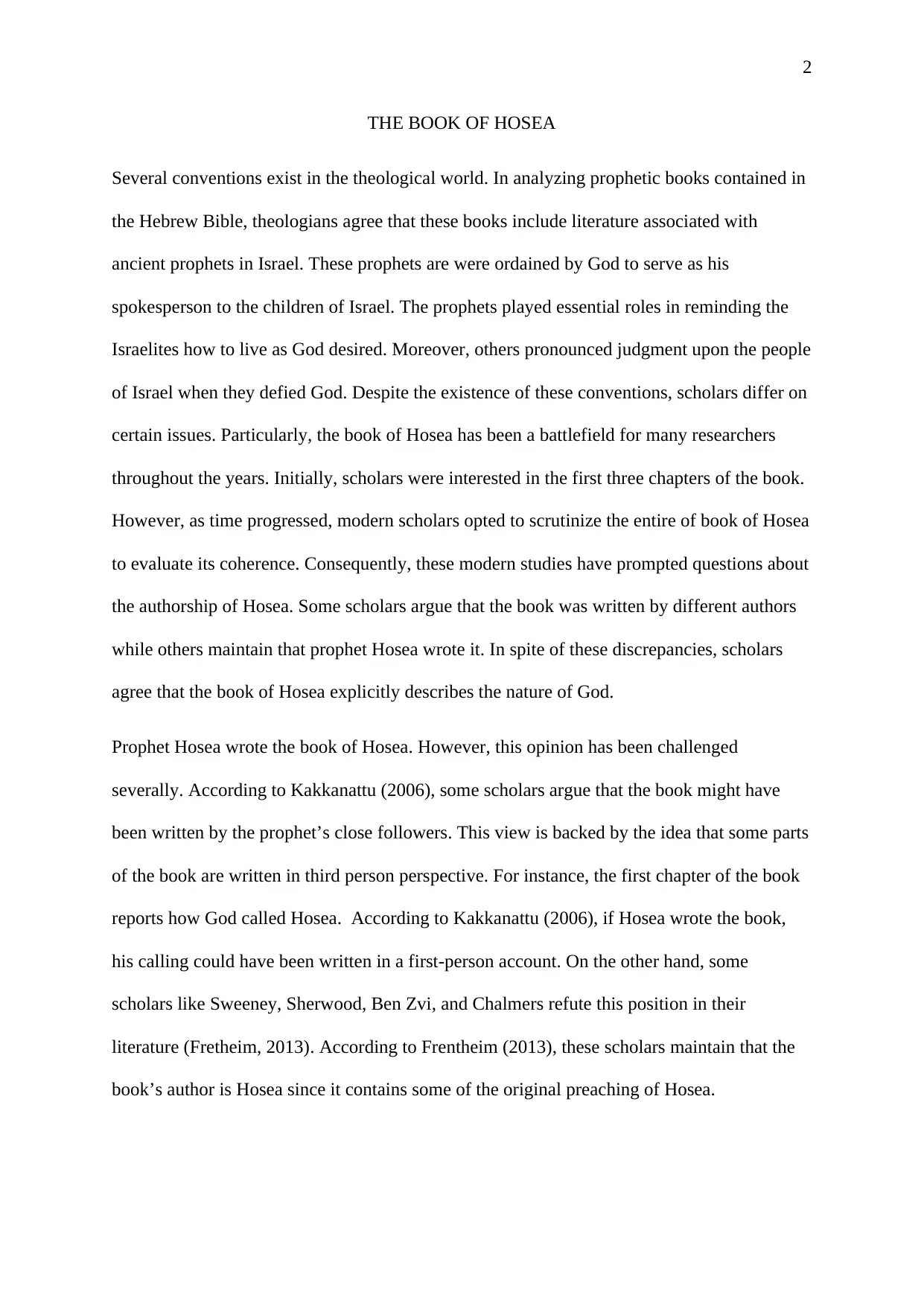
2
THE BOOK OF HOSEA
Several conventions exist in the theological world. In analyzing prophetic books contained in
the Hebrew Bible, theologians agree that these books include literature associated with
ancient prophets in Israel. These prophets are were ordained by God to serve as his
spokesperson to the children of Israel. The prophets played essential roles in reminding the
Israelites how to live as God desired. Moreover, others pronounced judgment upon the people
of Israel when they defied God. Despite the existence of these conventions, scholars differ on
certain issues. Particularly, the book of Hosea has been a battlefield for many researchers
throughout the years. Initially, scholars were interested in the first three chapters of the book.
However, as time progressed, modern scholars opted to scrutinize the entire of book of Hosea
to evaluate its coherence. Consequently, these modern studies have prompted questions about
the authorship of Hosea. Some scholars argue that the book was written by different authors
while others maintain that prophet Hosea wrote it. In spite of these discrepancies, scholars
agree that the book of Hosea explicitly describes the nature of God.
Prophet Hosea wrote the book of Hosea. However, this opinion has been challenged
severally. According to Kakkanattu (2006), some scholars argue that the book might have
been written by the prophet’s close followers. This view is backed by the idea that some parts
of the book are written in third person perspective. For instance, the first chapter of the book
reports how God called Hosea. According to Kakkanattu (2006), if Hosea wrote the book,
his calling could have been written in a first-person account. On the other hand, some
scholars like Sweeney, Sherwood, Ben Zvi, and Chalmers refute this position in their
literature (Fretheim, 2013). According to Frentheim (2013), these scholars maintain that the
book’s author is Hosea since it contains some of the original preaching of Hosea.
THE BOOK OF HOSEA
Several conventions exist in the theological world. In analyzing prophetic books contained in
the Hebrew Bible, theologians agree that these books include literature associated with
ancient prophets in Israel. These prophets are were ordained by God to serve as his
spokesperson to the children of Israel. The prophets played essential roles in reminding the
Israelites how to live as God desired. Moreover, others pronounced judgment upon the people
of Israel when they defied God. Despite the existence of these conventions, scholars differ on
certain issues. Particularly, the book of Hosea has been a battlefield for many researchers
throughout the years. Initially, scholars were interested in the first three chapters of the book.
However, as time progressed, modern scholars opted to scrutinize the entire of book of Hosea
to evaluate its coherence. Consequently, these modern studies have prompted questions about
the authorship of Hosea. Some scholars argue that the book was written by different authors
while others maintain that prophet Hosea wrote it. In spite of these discrepancies, scholars
agree that the book of Hosea explicitly describes the nature of God.
Prophet Hosea wrote the book of Hosea. However, this opinion has been challenged
severally. According to Kakkanattu (2006), some scholars argue that the book might have
been written by the prophet’s close followers. This view is backed by the idea that some parts
of the book are written in third person perspective. For instance, the first chapter of the book
reports how God called Hosea. According to Kakkanattu (2006), if Hosea wrote the book,
his calling could have been written in a first-person account. On the other hand, some
scholars like Sweeney, Sherwood, Ben Zvi, and Chalmers refute this position in their
literature (Fretheim, 2013). According to Frentheim (2013), these scholars maintain that the
book’s author is Hosea since it contains some of the original preaching of Hosea.
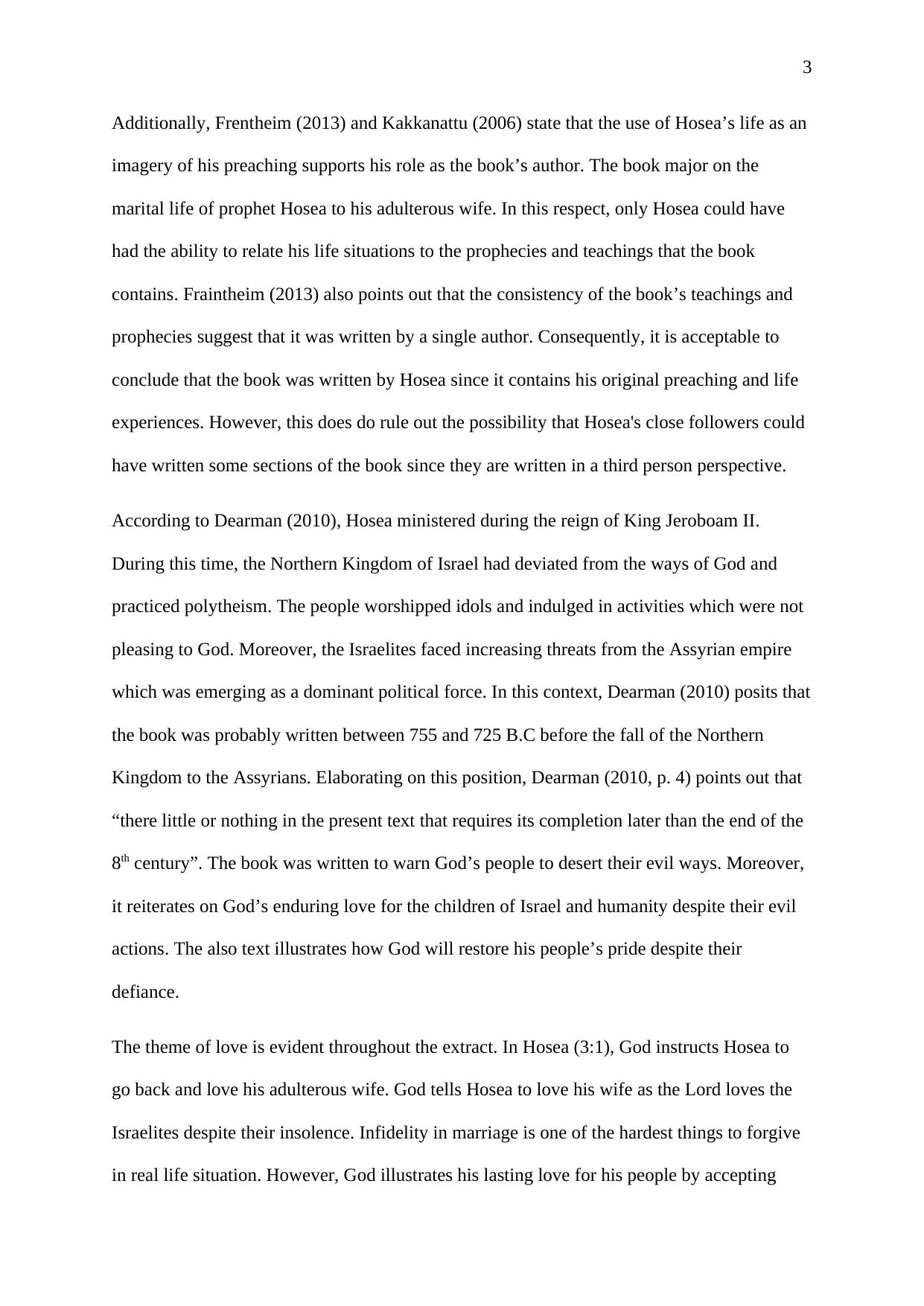
3
Additionally, Frentheim (2013) and Kakkanattu (2006) state that the use of Hosea’s life as an
imagery of his preaching supports his role as the book’s author. The book major on the
marital life of prophet Hosea to his adulterous wife. In this respect, only Hosea could have
had the ability to relate his life situations to the prophecies and teachings that the book
contains. Fraintheim (2013) also points out that the consistency of the book’s teachings and
prophecies suggest that it was written by a single author. Consequently, it is acceptable to
conclude that the book was written by Hosea since it contains his original preaching and life
experiences. However, this does do rule out the possibility that Hosea's close followers could
have written some sections of the book since they are written in a third person perspective.
According to Dearman (2010), Hosea ministered during the reign of King Jeroboam II.
During this time, the Northern Kingdom of Israel had deviated from the ways of God and
practiced polytheism. The people worshipped idols and indulged in activities which were not
pleasing to God. Moreover, the Israelites faced increasing threats from the Assyrian empire
which was emerging as a dominant political force. In this context, Dearman (2010) posits that
the book was probably written between 755 and 725 B.C before the fall of the Northern
Kingdom to the Assyrians. Elaborating on this position, Dearman (2010, p. 4) points out that
“there little or nothing in the present text that requires its completion later than the end of the
8th century”. The book was written to warn God’s people to desert their evil ways. Moreover,
it reiterates on God’s enduring love for the children of Israel and humanity despite their evil
actions. The also text illustrates how God will restore his people’s pride despite their
defiance.
The theme of love is evident throughout the extract. In Hosea (3:1), God instructs Hosea to
go back and love his adulterous wife. God tells Hosea to love his wife as the Lord loves the
Israelites despite their insolence. Infidelity in marriage is one of the hardest things to forgive
in real life situation. However, God illustrates his lasting love for his people by accepting
Additionally, Frentheim (2013) and Kakkanattu (2006) state that the use of Hosea’s life as an
imagery of his preaching supports his role as the book’s author. The book major on the
marital life of prophet Hosea to his adulterous wife. In this respect, only Hosea could have
had the ability to relate his life situations to the prophecies and teachings that the book
contains. Fraintheim (2013) also points out that the consistency of the book’s teachings and
prophecies suggest that it was written by a single author. Consequently, it is acceptable to
conclude that the book was written by Hosea since it contains his original preaching and life
experiences. However, this does do rule out the possibility that Hosea's close followers could
have written some sections of the book since they are written in a third person perspective.
According to Dearman (2010), Hosea ministered during the reign of King Jeroboam II.
During this time, the Northern Kingdom of Israel had deviated from the ways of God and
practiced polytheism. The people worshipped idols and indulged in activities which were not
pleasing to God. Moreover, the Israelites faced increasing threats from the Assyrian empire
which was emerging as a dominant political force. In this context, Dearman (2010) posits that
the book was probably written between 755 and 725 B.C before the fall of the Northern
Kingdom to the Assyrians. Elaborating on this position, Dearman (2010, p. 4) points out that
“there little or nothing in the present text that requires its completion later than the end of the
8th century”. The book was written to warn God’s people to desert their evil ways. Moreover,
it reiterates on God’s enduring love for the children of Israel and humanity despite their evil
actions. The also text illustrates how God will restore his people’s pride despite their
defiance.
The theme of love is evident throughout the extract. In Hosea (3:1), God instructs Hosea to
go back and love his adulterous wife. God tells Hosea to love his wife as the Lord loves the
Israelites despite their insolence. Infidelity in marriage is one of the hardest things to forgive
in real life situation. However, God illustrates his lasting love for his people by accepting
⊘ This is a preview!⊘
Do you want full access?
Subscribe today to unlock all pages.

Trusted by 1+ million students worldwide
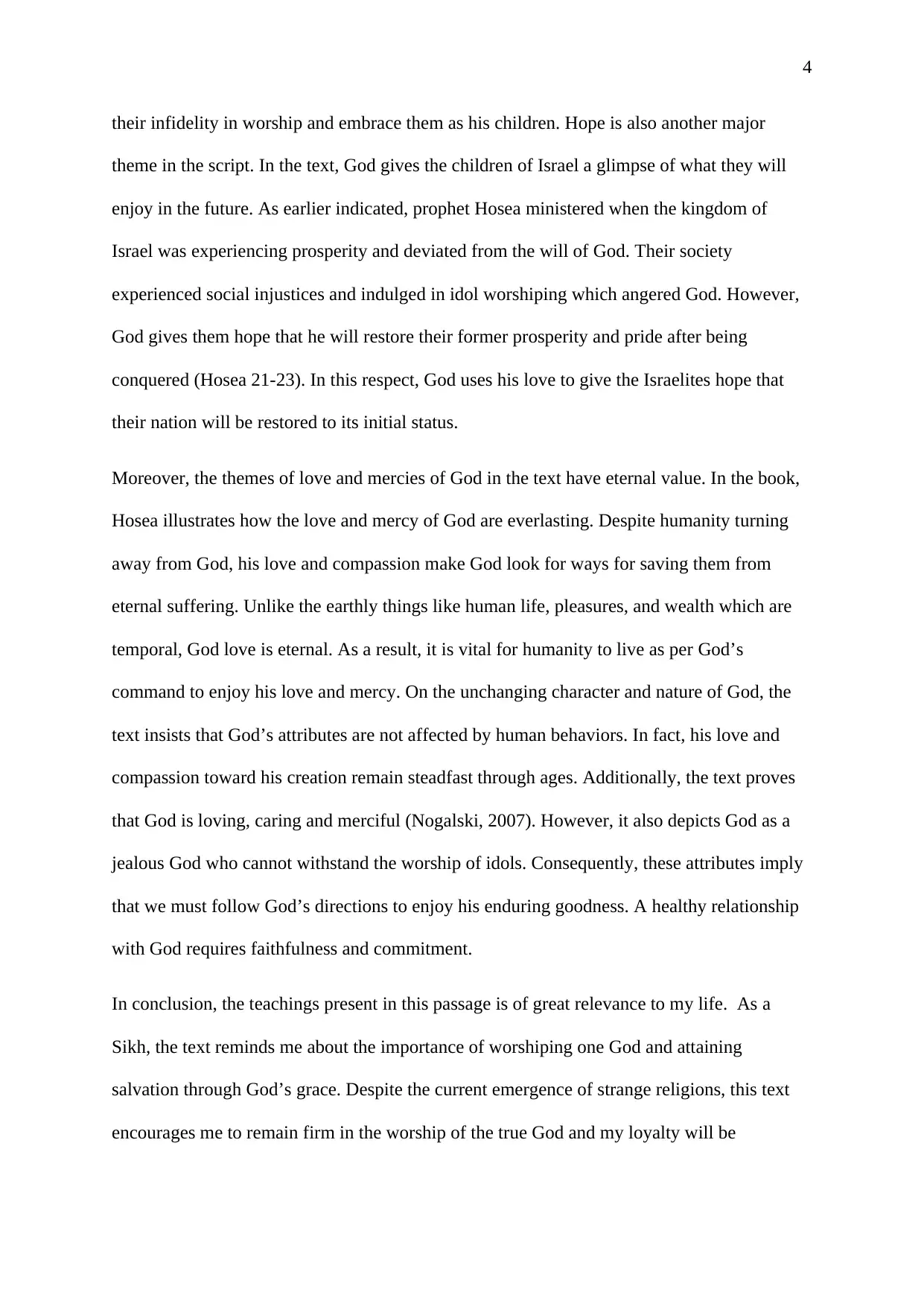
4
their infidelity in worship and embrace them as his children. Hope is also another major
theme in the script. In the text, God gives the children of Israel a glimpse of what they will
enjoy in the future. As earlier indicated, prophet Hosea ministered when the kingdom of
Israel was experiencing prosperity and deviated from the will of God. Their society
experienced social injustices and indulged in idol worshiping which angered God. However,
God gives them hope that he will restore their former prosperity and pride after being
conquered (Hosea 21-23). In this respect, God uses his love to give the Israelites hope that
their nation will be restored to its initial status.
Moreover, the themes of love and mercies of God in the text have eternal value. In the book,
Hosea illustrates how the love and mercy of God are everlasting. Despite humanity turning
away from God, his love and compassion make God look for ways for saving them from
eternal suffering. Unlike the earthly things like human life, pleasures, and wealth which are
temporal, God love is eternal. As a result, it is vital for humanity to live as per God’s
command to enjoy his love and mercy. On the unchanging character and nature of God, the
text insists that God’s attributes are not affected by human behaviors. In fact, his love and
compassion toward his creation remain steadfast through ages. Additionally, the text proves
that God is loving, caring and merciful (Nogalski, 2007). However, it also depicts God as a
jealous God who cannot withstand the worship of idols. Consequently, these attributes imply
that we must follow God’s directions to enjoy his enduring goodness. A healthy relationship
with God requires faithfulness and commitment.
In conclusion, the teachings present in this passage is of great relevance to my life. As a
Sikh, the text reminds me about the importance of worshiping one God and attaining
salvation through God’s grace. Despite the current emergence of strange religions, this text
encourages me to remain firm in the worship of the true God and my loyalty will be
their infidelity in worship and embrace them as his children. Hope is also another major
theme in the script. In the text, God gives the children of Israel a glimpse of what they will
enjoy in the future. As earlier indicated, prophet Hosea ministered when the kingdom of
Israel was experiencing prosperity and deviated from the will of God. Their society
experienced social injustices and indulged in idol worshiping which angered God. However,
God gives them hope that he will restore their former prosperity and pride after being
conquered (Hosea 21-23). In this respect, God uses his love to give the Israelites hope that
their nation will be restored to its initial status.
Moreover, the themes of love and mercies of God in the text have eternal value. In the book,
Hosea illustrates how the love and mercy of God are everlasting. Despite humanity turning
away from God, his love and compassion make God look for ways for saving them from
eternal suffering. Unlike the earthly things like human life, pleasures, and wealth which are
temporal, God love is eternal. As a result, it is vital for humanity to live as per God’s
command to enjoy his love and mercy. On the unchanging character and nature of God, the
text insists that God’s attributes are not affected by human behaviors. In fact, his love and
compassion toward his creation remain steadfast through ages. Additionally, the text proves
that God is loving, caring and merciful (Nogalski, 2007). However, it also depicts God as a
jealous God who cannot withstand the worship of idols. Consequently, these attributes imply
that we must follow God’s directions to enjoy his enduring goodness. A healthy relationship
with God requires faithfulness and commitment.
In conclusion, the teachings present in this passage is of great relevance to my life. As a
Sikh, the text reminds me about the importance of worshiping one God and attaining
salvation through God’s grace. Despite the current emergence of strange religions, this text
encourages me to remain firm in the worship of the true God and my loyalty will be
Paraphrase This Document
Need a fresh take? Get an instant paraphrase of this document with our AI Paraphraser

5
rewarded. With the extract insisting that God’s nature is invariable, it is vital to uphold all the
commands of the one true God in time of prosperity and suffering.
rewarded. With the extract insisting that God’s nature is invariable, it is vital to uphold all the
commands of the one true God in time of prosperity and suffering.
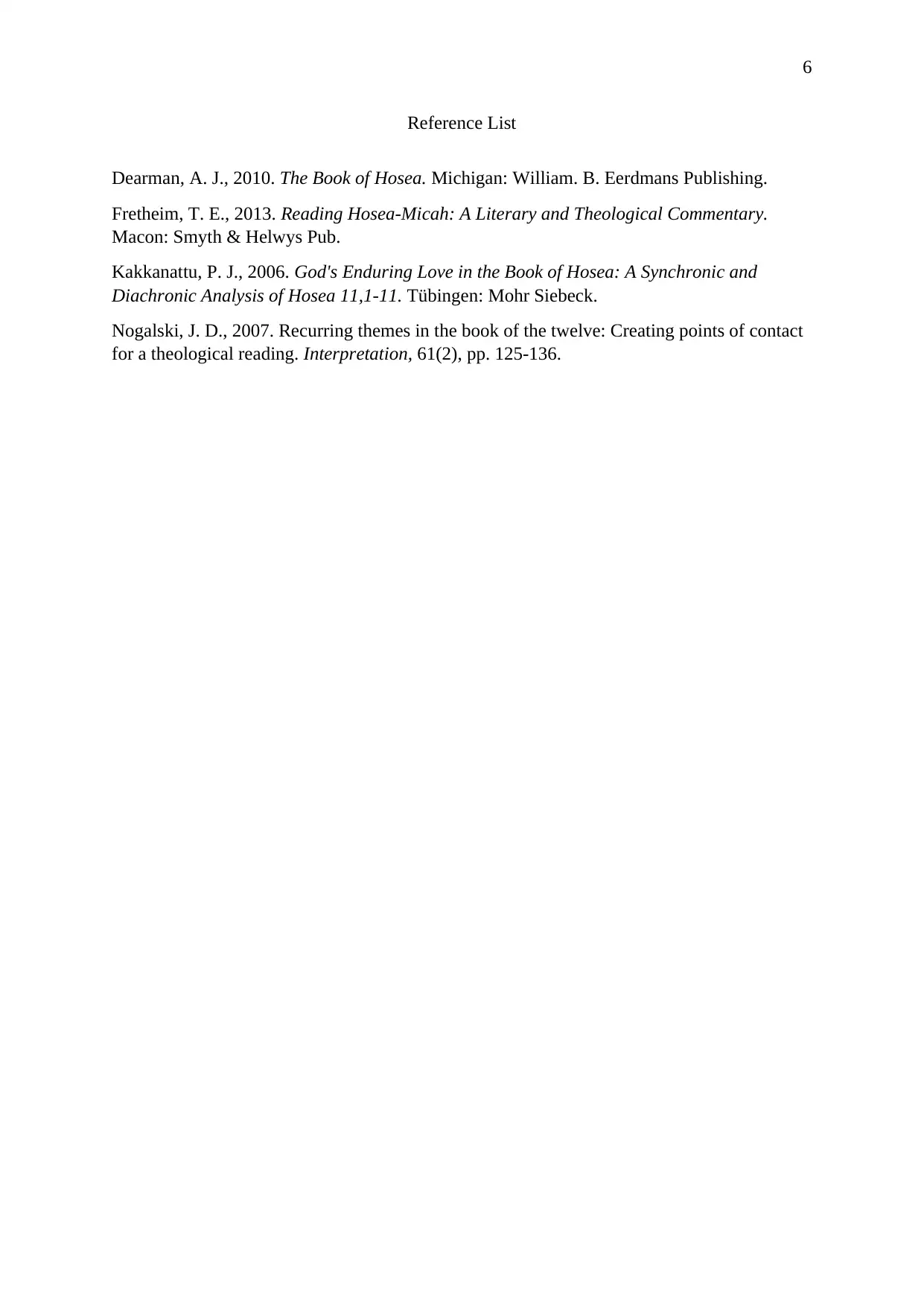
6
Reference List
Dearman, A. J., 2010. The Book of Hosea. Michigan: William. B. Eerdmans Publishing.
Fretheim, T. E., 2013. Reading Hosea-Micah: A Literary and Theological Commentary.
Macon: Smyth & Helwys Pub.
Kakkanattu, P. J., 2006. God's Enduring Love in the Book of Hosea: A Synchronic and
Diachronic Analysis of Hosea 11,1-11. Tübingen: Mohr Siebeck.
Nogalski, J. D., 2007. Recurring themes in the book of the twelve: Creating points of contact
for a theological reading. Interpretation, 61(2), pp. 125-136.
Reference List
Dearman, A. J., 2010. The Book of Hosea. Michigan: William. B. Eerdmans Publishing.
Fretheim, T. E., 2013. Reading Hosea-Micah: A Literary and Theological Commentary.
Macon: Smyth & Helwys Pub.
Kakkanattu, P. J., 2006. God's Enduring Love in the Book of Hosea: A Synchronic and
Diachronic Analysis of Hosea 11,1-11. Tübingen: Mohr Siebeck.
Nogalski, J. D., 2007. Recurring themes in the book of the twelve: Creating points of contact
for a theological reading. Interpretation, 61(2), pp. 125-136.
⊘ This is a preview!⊘
Do you want full access?
Subscribe today to unlock all pages.

Trusted by 1+ million students worldwide
1 out of 6
Related Documents
Your All-in-One AI-Powered Toolkit for Academic Success.
+13062052269
info@desklib.com
Available 24*7 on WhatsApp / Email
![[object Object]](/_next/static/media/star-bottom.7253800d.svg)
Unlock your academic potential
Copyright © 2020–2025 A2Z Services. All Rights Reserved. Developed and managed by ZUCOL.



